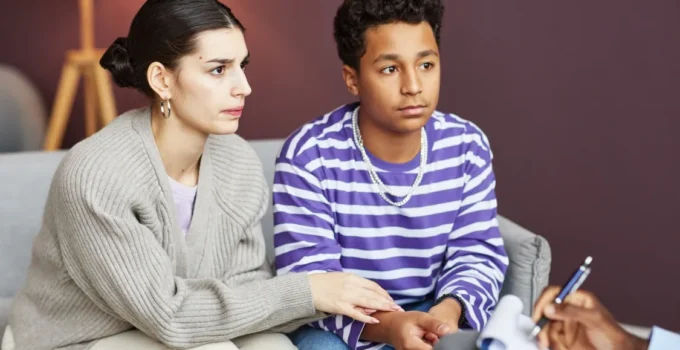The mental health struggles of children and adolescents are often minimized compared to physical illnesses. But left unaddressed, they precipitate lasting health, social, and economic burdens for youth, families, and societies over decades. This underscores the vital role the evolving specialty of child & adolescent psychiatry plays in assessing developmental disorders early and delivering timely psychosocial and pharmacological interventions to alleviate acute symptoms and teach lifelong coping skills.
This article spotlights patterns noticed in child psychiatry clinics that serve as early red flags parents or schools shouldn’t dismiss without deeper evaluation. We explore how pairing compassionate, evidence-based therapies tailored to the age group achieves meaningful improvement in youths’ quality of life despite serious conditions, allowing them to thrive into adulthood and making communities healthier.
Lifelong Conditions Often Take Root Young

Mental health disorders frequently seen in adults like anxiety, mood disorders, and psychosis have their onset in the formative developmental years. Three-fourths manifest by age 24, with fifty percent of cases appearing before age 14. The few years between a child’s first symptoms and accessing treatment make a dramatic difference in illness course over their lifespan.
For example, spotting and addressing early signs of obsessive thoughts, emotional reactivity, or learning disabilities from age 7 onwards with play therapy and teaching families coping tactics prevents full-blown adult OCD or bipolar disorder from setting in by 18. Early intervention radically alters one’s trajectory.
Red Flags Not To Dismiss
So what concerning behavioral patterns should caregivers take seriously if exhibited consistently rather than occasionally? And when should assessment from a specialist be sought? Red flags include:
- Sudden declining academic performance despite previous success
- Withdrawal from peers and activities once enjoyed
- Frequent sulking, aggression, or defiant behaviors
- Self-harm attempts like cutting or burning skin
- Expressing hopeless, negative views excessively
- Disordered eating habits – bingeing, purging, or appetite loss
- Difficulty concentrating exacerbating chores/homework
- Distinctly obsessive interests, habits, or rituals
Any of the above, either in isolation or together, warrants consulting a child psychiatrist or therapist, like YourLocalPsychiatrist, to map symptoms correctly to a clinical diagnosis like depression, anxiety, ADHD, autism spectrum disorder, etc. Evidence shows even a year’s delay in seeking help after chronic issues begin dramatically diminishes intervention effectiveness. The sooner care starts, the better the likely outcomes.
The Evolution of Child & Adolescent Psychiatry

Source: verywellmind.com
Advancements in Treatment and Therapy
The field of child and adolescent psychiatry has seen considerable advancements in both treatment and therapy options. From traditional talk therapy to more modern approaches like cognitive-behavioral therapy and family therapy, there are now more ways than ever to support young people in their mental health journeys.
The Importance of Personalized Care
Every child or adolescent is unique, and their treatment should be too. Personalized care is at the heart of child and adolescent psychiatry. Psychiatrists in this field take the time to understand each individual’s specific needs, tailoring their approach to provide the most effective treatment possible.
Comprehensive Psychiatric Evaluation

Thorough evaluation by a child psychiatrist experienced in testing, diagnosis, and treating youth disorders is the next essential step after concerning symptoms are consistently noticed. Comparing impressions across settings, they will:
- Interview the child directly about thoughts, feelings, and behaviors
- Get input from parents and teachers about observations from home and school
- Rule out learning disabilities, developmental delays, or medical issues by ordering relevant testing
- Determine if criteria for disorders like anxiety, OCD, Tourette’s, and bipolar depression are fully met
- Assess for trauma, family dynamics, or peer relation factors possibly worsening behaviors
- Design a tailored treatment plan addressing the child’s unique challenges and strengths
Based on the child’s age, evaluations may involve playing games, answering questions, or interacting more conversationally. Input from adults who know the youth well across environments helps build an accurate, three-dimensional perspective. Following diagnosis, suitable therapies and medications commence.
Evidence-Based Psychiatric Treatments
Once assessment is complete, a combination of therapeutic techniques and medications together often yields the best results in treating serious childhood psychiatric illnesses.
Psychotherapies
Developmentally appropriate therapy modalities like play, family, or cognitive-behavioral therapy build critical social-emotional skills and thought patterns in children/ teens that last a lifetime:
- Play therapy uses games, art, and Storytelling related to the child’s struggles to express feelings, learn coping mechanisms, and bolster self-esteem from failures
- Family therapy improves home interactions, communication, and support
- Cognitive-behavioral therapy challenges irrational worries and perfectionism to develop healthier perspectives despite uncertainty. Apps now deliver CBT too.
Medications
Under medical guidance, pills can quickly relieve debilitating psychiatric symptoms to supplement therapy, enabling kids to engage more actively and absorb other interventions better. Commonly prescribed medications include:
- Stimulants for ADHD and concentration/focus issues
- Antidepressants and mood stabilizers for depression or bipolar disorder
- Anti-anxiety medicines for alleviating obsessive thoughts or compulsions
- Atypical antipsychotics for early psychosis, tics, or severe aggression
Together, therapies teach vital life skills while medications reduce pathological symptoms so children can fully participate in social and academic activities critical for development.
Lifestyle Changes and Support

Alongside clinical treatments, tweaking daily habits and environments to help stabilize mood and behaviors also aids youth in managing chronic mental health issues. Useful strategies include:
- Establishing firm sleep, meal, and study schedules
- Minimizing stimulation and disruption
- Exercising regularly to relieve pent-up energy
- Making small friend groups feel welcomed and needed
- Celebrating little successes using reward systems
With compassion and the right professional help, children and teens can absolutely thrive socially and academically despite facing emotional struggles or wiring differences. Early intervention prevents small challenges from accumulating into lifelong functional disability.
The Critical Value of Child Psychiatry
Far too often dismissing childhood psychiatric issues as transient “phases” leads to decades of hardship instead of timely care had warnings been recognized before acute crisis points. Early detection and evidence-based therapies literally rewire developing brains more fluidly, dramatically improving youths’ ability to manage residual symptoms confidently into adulthood without being held back by mental health barriers as drastically over life.
This emphasizes the incredible value child and adolescent psychiatry offers through:
- Thorough, accurate issue identification
- Teaching healthy coping instead of avoidance
- Relieving present suffering so kids fully engage with academic/social milestones.
- Proactively addressing maladaptive patterns before they rigidify into chronic adult psychopathology
- Supporting families through complex diagnostic processes
- Educating society to erase the stigma around childhood mental healthcare
The more this medical specialty and its proven benefits are understood by the wider public over the coming years, the more engaged communities will become in advocating for relevant policy changes and funding allocations toward early access for struggling youth everywhere.
Prioritizing children’s developmental needs has the power to uplift the trajectories of entire generations worldwide, making future societies healthier, more resilient, and more harmonious. The seeds lie in supporting better mental health at the very beginning.







